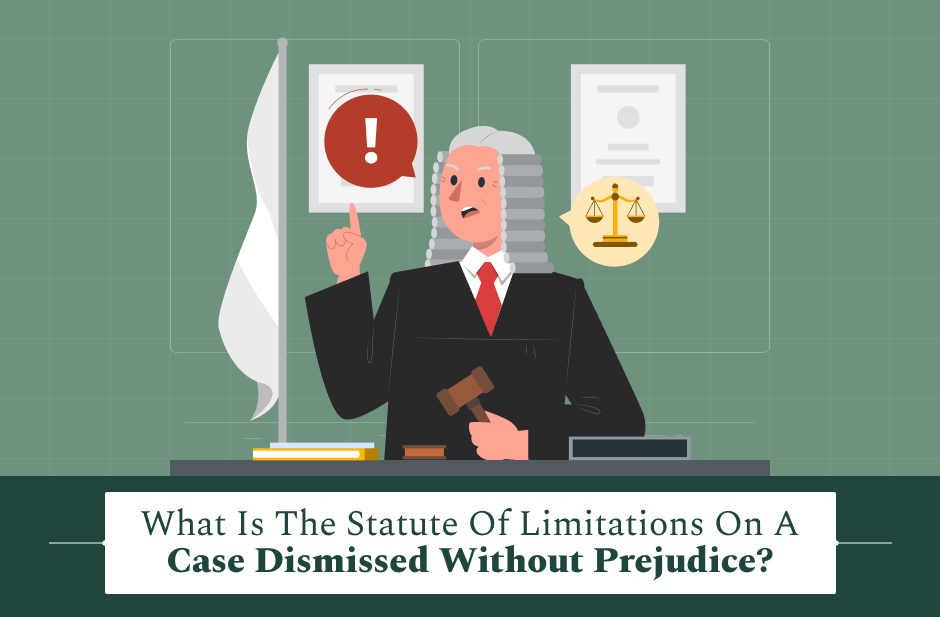Trying to wrap your head around the statute of limitations on a case dismissed without prejudice? Yeah, it can feel like you’ve just walked into a maze of legal jargon.
But hang in there—I’ve got you. I’m going to walk you through what “dismissed without prejudice” really means, what this whole “statute of limitations” thing is about, and why these two matter if you’re thinking of filing again.
See, just because a court tosses your case doesn’t always mean it’s the end of the road. If it’s dismissed without prejudice, it’s kind of like the court saying, “This isn’t over—come back when you’re ready.”
The thing is, there’s a deadline for coming back, and that’s where the statute of limitations kicks in. So, how does that deadline work, and what do you need to do if you’re planning to refile?
If these are the things that you want to know, you have come to the right place. Therefore, keep on reading this blog till the end…
When is a Case Dismissed Without Prejudice?

Alright, let’s break it down.
When your case gets dismissed without prejudice, it means the court isn’t shutting the door on you completely. It’s saying, “Hey, something’s off—go fix it and try again.”
Imagine your teacher saying, “This homework isn’t quite right, but I’ll give you a chance to redo it.” That’s the vibe here. You didn’t flunk—you just didn’t nail it the first time.
Now, why would a court do that? Here are a few common reasons:
- You filed in the wrong court.
- Some paperwork was missing or filled out wrong.
- You or your lawyer didn’t show up when you were supposed to.
- The case needs more info before it can go anywhere.
But here’s the key part: this kind of dismissal isn’t a punishment. It’s more like a pause button. You’ve still got a shot to fix the issue and file again.
Now compare that to a case dismissed with prejudice—that’s the court slamming the door shut. Game over. You can’t bring that case back.
So yeah, if your case is dismissed without prejudice, take it as the court giving you another shot. Just don’t take forever.
What Is The Statute Of Limitations On A Case Dismissed Without Prejudice?

Think of the statute of limitations like a ticking clock. It’s the time you have to file your case. Once that time runs out? Well… you’re out of luck.
Now you might be wondering, “If my case gets dismissed without prejudice, do I get a fresh clock?”
Nope. The original clock keeps ticking. The court doesn’t reset it just because your case was dismissed. That’s super important.
Let’s say you filed right before time was about to run out—and then the court dismisses your case without prejudice. Yikes. That means you’ve got only a tiny window left to fix the issue and refile.
So the second you find out your case got dismissed, you need to act fast. Check how much time you’ve got left. Don’t assume you’ve got forever.
Statute of Limitations for Different Types of Cases
Here’s a quick peek at how long you usually have for different types of cases. Keep in mind—it can vary depending on the state you’re in.
| Type of Case | Statute of Limitations |
| Medical Malpractice | 1 to 2 years |
| General Personal Injury Claims | 1 to 3 years |
| Wrongful Death | 1 to 3 years |
| Product Liability | 2 to 4 years |
So yeah, these numbers matter—a lot.
Example of Statute of Limitations for Case Dismissed Without Prejudice
Let’s run through a real-life-ish example, shall we?
Say your state gives you 2 years to file a personal injury lawsuit. You end up filing it 1 year and 10 months after the accident. But… uh-oh, the court tosses it because you forgot to include some key paperwork.
Now what?
You’ve only got 2 months left to clean it up and refile. Because that original 2-year clock didn’t stop or restart—it just kept ticking.
If you wait past the 2-year mark from the date of the injury, even if your case was dismissed without prejudice, you’re done. The clock ran out.
So bottom line? Dismissed without prejudice doesn’t mean unlimited chances.
What Happens When A Case is Dismissed Without Prejudice?
To put it in simple terms, if your case gets dismissed without prejudice, here is what usually happens:
- The court takes your case off the docket—basically, it’s like it’s temporarily off the schedule.
- You are given the opportunity to correct the mistake that caused the problem—perhaps it was just a paperwork issue.
- You have the option of filing it again, but of course, this is only the case if the statute of limitations is still in force.
The main point? The court is not rejecting your case. It is simply confirming that “You have to do this correctly.”
However, do not become complacent and wait. The time is ticking. Get organized as soon as possible, talk to a lawyer if you’re not sure, fix what needs to be fixed, and refile before it’s too late.
How Many Times Can You Refile?
Here’s the thing—there’s no exact limit written in stone for how many times you can refile a case that was dismissed without prejudice. Technically, you can do it more than once if the statute of limitations hasn’t expired.
But—and it’s a big but—if you keep refiling and withdrawing the same case again and again, the judge might just say, “Okay, that’s enough.” Courts don’t love it when people abuse the system or try to stall things out.
Also, don’t forget: every time you refile, that same old deadline still applies. The timer doesn’t reset.
So yeah, while the law might allow a few do-overs, don’t treat it like a game. Make your next shot count. Do it right, fix the flaws, and refile it like it’s your last try.
Your Legal Guide: What are the Steps to Refile a Dismissed Without Prejudice Case?
Have you ever thought about trying it again? Well, in case you were wondering: You absolutely can. And how can you do that?
Here’s a simple guide to help you do that in the correct way:
- Find out the reason: You need to know why your case was dismissed. Go through the court’s paperwork—or if possible, have your lawyer explain it to you in simple words.
- Correct the mistake: It doesn’t matter if you left out a form, filed in the wrong court, or did not give it in on time—just fix it.
- Confirm your time limit: Keep in mind, the statute of limitations has never stopped, even when your case got dismissed. You should be clear about how much time is still available to you.
- Bring the case again: After you have solved the issue, submit the claim again. Be sure to do it correctly and this time choose the right place for filing.
- Don’t hang around: Really, the longer you procrastinate, the closer you’ll be to losing your chance. Act quickly.
Your case getting dismissed may make you feel anxious and uncertain which is perfectly normal. However, “without prejudice” signifies that the case is not finished.
If you perform well and also have a little legal support, you are still in with a chance to get your case heard and decide the issue.
Read Also:
















